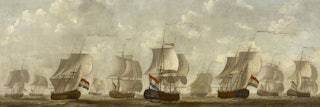The trading of African people who were forced into slavery was the ‘core business’ of the MCC (The Middelburgse Commercie Compagnie). The archive of the MCC has been declared to be a ‘Memory of the World’ by UNESCO.
The trading of Africans who were forced into slavery was the ‘core business’ of the MCC (The Middelburgse Commercie Compagnie). From 1732 to 1807, 31.095 African slaves were bought by the MCC with the intention to sell them in the West Indies. The archive of the MCC is kept by the Zeeland Archives and is included on UNESCO’s World Heritage List.
World Heritage
The documents in the archive of the MCC meticulously portray the slave trade activities.
The extensive details, completeness, and the remarkable condition of the archive influenced the UNESCO’s decision to include the archive of the MCC on the world heritage list for documents. The archive of the MCC is included in the Memory of the World Register since May 2011.
Trans-Atlantic slave trade or triangular trade
How did the trading work? In Africa, the MCC traded material goods for Africans who were forced into slavery. The Africans were transported on the Atlantic Ocean and sold in the West Indies to other traders and plantation-owners. The MCC ships sailed back to Zeeland with the products from the plantations, which primarily consisted of sugar, tobacco, and
cocoa. This form of slave trade is called Trans-Atlantic slave trade or Triangular Trade.
A rare source worldwide
The MCC separately recorded all administration aboard every ship and for every journey. They recorded all accounting, ship journals and correspondence. This extensively detailed administration of the slave trade is presented virtually complete and intact in the Archive of the MCC. This makes the archive an extremely rare source worldwide.
Digitalization completed in 2015
The Zeeland Archives strives to digitalize the entire archive of the MCC and once this has been achieved, online publication will follow swiftly. This aspiration is being realized thanks to the support of Metamorfoze, National Program for the Conservation of the Paper Heritage. This digitalization project has started in June 2012, and the first digitalized records have been published online recently in 2014. The digitalization project is expected to be finished in the fall of 2015.
Blog MCC Slave trade journey of the ‘Eenigheid’
In order to introduce a broad audience to the archive of the MCC, the Zeeland Archives presents the records of one of the 113 preserved slave trade voyages by means of a blog. The published records tell the story of a slave trade voyage of the ship named the ‘Eenigheid’ from 1761 to 1763. This triangular trade route started in Europe and took off to West-Africa and the Caribbean. .
Visitors of the website were able to keep up with the daily events aboard the ‘Eenigheid’ for about a year and a half, from October 1st 2013 until March 26th 2015. More than 50.000 interested visitors from across the world have been following the ‘Eenigheid’s’ journey.
The blog including interactive map can be accessed in Dutch and in English. All 452 days of the ship’s voyage are published.
Educational website
In addition to the blog, the Zeeland Archives has also developed an educational website for teachers who are part of the Primary and Secondary Educational sector. The educational website “Slave trade voyage of the ‘Eenigheid’” provides information in two languages, Dutch and English, and offers additional lessons and research assignments.
National commemoration 2014
The national commemoration remembering the bicentennial anniversary of the abolishment of Dutch slave trade took place in Middelburg in 2014.
University College Roosevelt
University College Roosevelt (UCR) which is located in Middelburg, has turned its focus on the archive of the MCC, for two semesters. The students were introduced to archival research, in two research seminars, which are part of the history track of the faculty of Arts & Humanities. They also defined the scope of their own research projects and eventually executed their own research, making use of the archives of the MCC.
